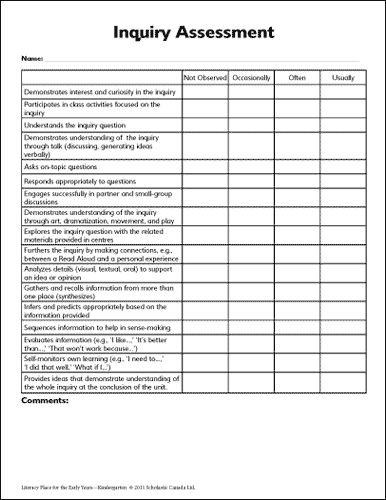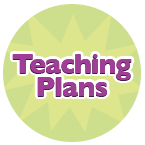Inquiry units in kindergarten focus on helping students to think about and ‘start a conversation’ on an issue. These units promote exploration, questioning, and problem solving to focus students on thinking critically and delving below the surface of a topic.
With young children, this type of inquiry is facilitated by providing materials and instructional contexts that can fully support learning. With this in mind, each of the kindergarten inquiry units offers a Read Aloud and two Shared Reading texts. Teacher support is readily available in both read aloud and shared reading contexts.
Young children inquire through listening, questioning, sharing, talking, moving, dramatizing, playing, and artistic expression, and the units offer numerous opportunities for exploring issues in developmentally appropriate ways.
Although a significant emphasis is placed on critical thinking through inquiry in these units, lessons equally support the development of oral language, reading comprehension, working with words, and writing strategies. The language, literacy, and critical thinking strategies acquired in these units will offer helpful tools for students when they pursue their self-initiated inquiries during centre times.
The same comprehension strategies of self-monitoring, analyzing, sequencing, making connections, predicting, inferring, synthesizing, and evaluating are used in all Literacy Place for the Early Years lessons. In the inquiry units, a range of strategies are integrated into each lesson and a comprehension purpose strategy is highlighted.
MONITORING PROGRESS
Literacy Place for the Early Years offers many options for assessment through observation. During each inquiry unit, you will have numerous opportunities to observe students as they inquire through talk, dramatization, movement, artwork, and play.
The Inquiry Assessment provides a checklist for you to observe and note student engagement with, and understanding of, the inquiry unit topic. If the same tool is used during each unit, you will you be able to monitor student growth over time.

You will also wish to monitor other developmental areas. You may choose to use one or more of these assessment tools during each inquiry unit:
Use the Oral Language Assessment Scale to quickly observe and note oral language behaviours. Or, you may choose to use the Oral Language Development Checklist (see the K–3 Program and Planning Guide, pp. 81–83) for a more detailed monitoring of progress of children needing support in this area.
Use the Book Handling and Print Tracking Assessment (see the Kindergarten Reading Guide, p.13) to check on early literacy concept development.
Use the Working with Words Checklists (see the Kindergarten Working with Words Guide, pp. 97–105) to record observed development in phonemic/phonological awareness, letter recognition, knowledge of high-frequency words, word solving and building skills, and the use of context (language predictability).
SCHEDULING
The time you take to explore an inquiry issue will depend on your preferences and the needs of your students. The Literacy Place for the Early Years inquiry units are designed to be flexible.
The teaching plans suggest that you use the Read Aloud, the two Shared Reading pieces, and the writing study as a unit. If you do this, a unit may take you 2-3 weeks, depending on the number of extensions you explore.
Alternatively, you may decide to run the inquiry intermittently over a longer time period. For example, you may introduce the inquiry, explore the issue with the Read Aloud, and then come back to the inquiry with a Shared Reading piece at a later time.
Approximate times are provided for each lesson, although these times will vary depending on the interests and needs of your students, and whether you pursue one or more of the lesson extensions.
